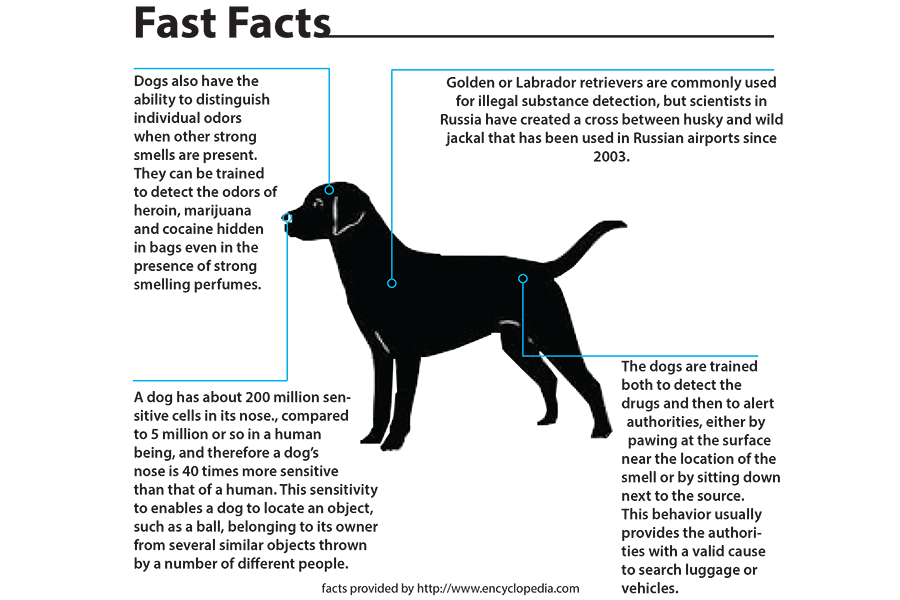Dog Deployment
Drug Sniffing Canines Back on Campus
Cody Blair doesn’t know when they are coming. He doesn’t know which rooms they will search. But even if the dogs don’t signal their trainers and no contraband items are found he will consider the sweep a success.
As an assistant principal organizing this semester’s Drug Dog sweeps is one Blair’s administrative responsibilities. He said that he has been a part of a number of sweeps but this is the first in a year and a half. Kontraband Interdiction and Detection Services or K.I.D.S., the company WFISD has contracted with, brings specially trained non-aggressive canines onto school campus to deter students from bringing contraband substances to school.
Before a classroom is checked, students will be asked to exit the classroom (for 5 to 8 minutes) while school personnel accompany the canine team. With an administrator or teacher present, the canine team will sniff the interior of the room including the air around any belongings left behind.
The canines are trained to detect odors from Illicit drugs like marijuana, cocaine, methamphetamines, heroin, opium, as well as alcohol, gunpowder, and residual odors. Although they are banned on campus the canines cannot detect odors from prescription medicine, but they may react to some prescription pain meds that contain common opiates.
“Without a doubt, the problem is a pervasive one extending beyond school or company property,” President of K.I.D.S. Steven Essler stated on the company website. “Therefore, we have carefully assembled an experienced and professional staff to assist with prevention while providing hands-on seminars for the entire community to deter substance abuse both on and off school grounds as well as in the workplace.”
The KIDS staff will randomly visit campus where the dogs will sniff the air around lockers, gym areas, restrooms, vehicles, vacated classrooms and school grounds as they search for potential contraband items.
This includes backpacks, purses etc. Essler said that K.I.D.S. policy prevents their dogs from sniffing any student, employee, visitor or anyone else while on district property or at any district event. All of the K.I.D.S. canines are friendly and trained to sit when they detect the odor of any of the contraband item.
“We gave careful consideration to the team of individuals that will provide our clients with the most comprehensive services available anywhere in the United States,” Essler said. “We are confident we will deliver and we look forward to the privilege of providing our client base with the best quality service they would expect and deserve.”
Once the handler has confirmed the canine’s indication, they will find the owner of whatever has been detected. First the handler will confirm that the person present is the owner. Then the handler will ask the owner of the contraband if they can think of anything in their possession that the dog could have detected. After their response, the handler will ask permission to inspect the item. After the owner gives permission and physically opens the item, the handler will conduct an inspection.
“If the owner refuses, the handler will turn the incident over to the campus official for follow through under established district policies and procedures,” Essler said. “If there is any contraband or items prohibited under school policy, the handler will collect and turn it over to the campus official with the appropriate documentation.”
All confirmed canine indications are documented in an Incident Outline Maintenance Report (IOMR) and a copy is provided and retained by a campus official at the conclusion of each visit.Still the main purpose of this program is to deter students from bringing illegal substances to school; however, Essler said it also serves a minimally invasive way of keeping students and staff safe. The dogs will help locate and remove contraband, including possible weapons, from the campus.
“Most of the ones I’ve been a part of are pretty routine. We try to keep them very formal and professional,” Blair said. “They are bringing them back because I think the district realizes the value of that deterrent. Just the fact that kids know they are going to occur helps deter illegal items from coming on campus making the campus safer, healthier and focused on learning both here at Rider and at all of the secondary campuses where this is happening.”

